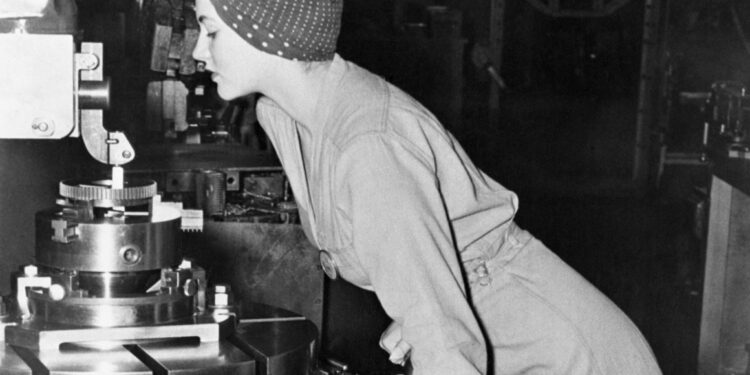Naomi Parker, the real-life inspiration behind the iconic “Rosie the Riveter” image, remains a symbol of strength and determination during World War II. Although her name might not be as well-known as the famous poster, her impact on women’s history is immeasurable. Born in 1921 in Tulsa, Oklahoma, Parker grew up in a working-class family and learned the value of hard work and dedication from an early age.
In 1942, as the United States entered the war, Naomi Parker, like millions of other American women, answered the call to serve her country. She joined the war effort by working as a riveter at the Naval Air Station in Alameda, California. Her job involved building aircraft, a crucial role in supporting the war effort. With her sleeves rolled up and a determined expression, she became a powerful symbol of women’s contribution to the wartime manufacturing industry.
It was a photograph taken by a government photographer in 1942 that would later immortalize her. The photograph, showing Parker at work wearing overalls and a polka-dotted bandana on her head, captured the essence of the hardworking women behind the home front’s success. This photograph would go on to inspire the creation of the famous “We Can Do It!” poster that later became synonymous with the Rosie the Riveter campaign.
Despite the recognition the Rosie the Riveter poster received, Parker’s identity remained unknown to the public for many years. The woman behind the poster was a mystery until the 1980s when a chance discovery of the original photograph led to Parker’s identification. This revelation shed light on the countless other women whose efforts had been overlooked in history.
Naomi Parker’s work as a riveter was not just a temporary wartime role; it paved the way for increased opportunities for women in the workforce. After the war, she continued to work in manufacturing and remained an advocate for women’s rights and equal opportunities in the workplace. Her dedication and resilience inspired generations of women to break free from traditional gender roles and pursue their dreams.
In 1999, Naomi Parker passed away, leaving behind a legacy of empowerment and perseverance. Her contribution to the war effort and the advancement of women’s rights will forever be etched in history. Today, as we celebrate the achievements of women and the progress made in gender equality, let us remember and honor the unsung heroine, Naomi Parker, whose strong spirit and unwavering determination continue to inspire and empower women around the world.
newshub



Recent Comments